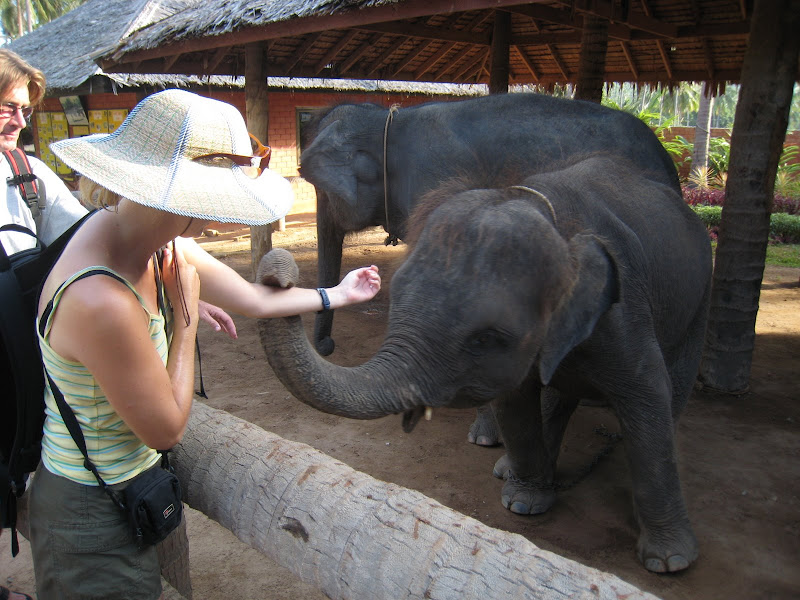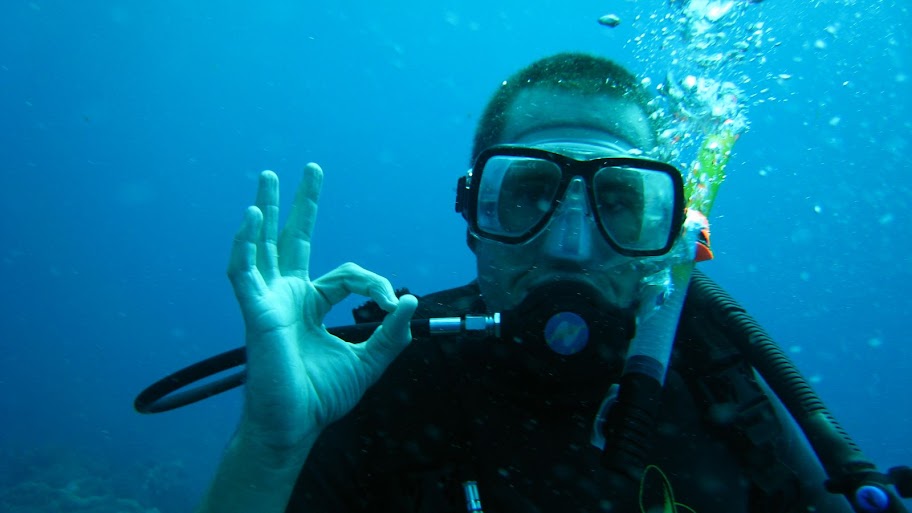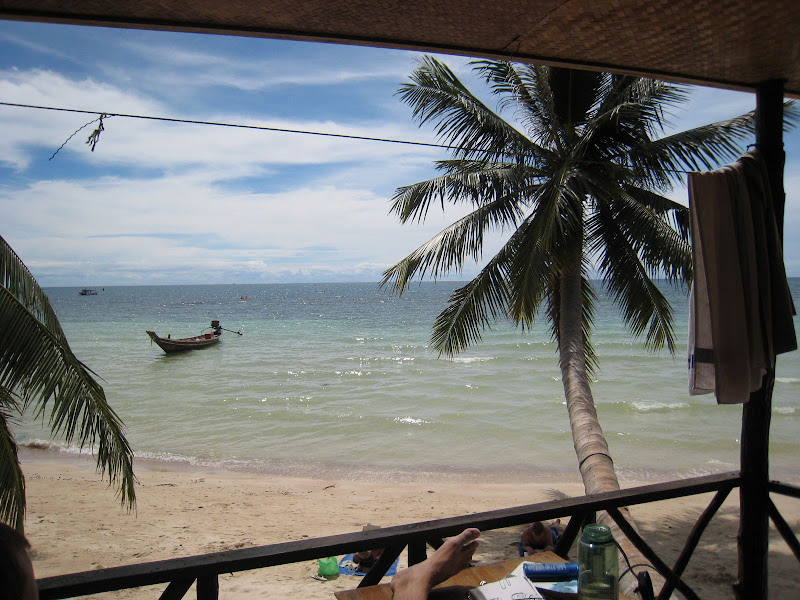
We keep telling ourselves we are going to blog more often so we don't have so much we want to share in each entry, but then life and travel gets away with us and we find ourselves sitting here in front of the screen wondering what we most want to share without boring you with too many details...so here goes...
BangkokNot too much to share about Bangkok really...it's a big Asian city with lots of temples (which we ashamedly neglected to see - we were a bit
templed out after China and needed a break). The most notable things we did in Bangkok were get daily massages at a place called
Sumali's. One word: Incredible! Enough said.
We also ended up each evening in the Middle Eastern/African district at
Nefartiti's Restaurant, which just happened to have the most amazing hookah and shisha Eric has tried (hence, why we ended up there every evening). This was the real deal - great
Mediterranean food, and a mix of Middle Easterners smoking the water pipes.
And the last thing we did of significance was splurge on the VIP Theatre at a fancy new mall to

see "
Bourne Ultimatum."
Ok,
ok...so the seats were $15 each in THAILAND, but it was the only theater playing the movie at that time and we really wanted to see it. It was a cool experience though...lounge seats that reclined all the way back (careful not to nap!), blankets, pillows, your own special waiting lounge - very posh. And the movie was great - suspense filled and just what the doctor ordered to lift us away from traveling and into the world of the movies where it feels the same as home. After the show, we headed back to the hostel to grab our things, hail a taxi and catch a flight to
Koh Samui...
Koh SamuiIt took us awhile to get into the swing of beach life and actually relax after our fast paced travel the last few months. But beautiful islands eventually get to you and you find yourself drifting into a serene daily routine that consists of sleeping (including napping), eating, drinking, swimming and sun bathing. We can't complain too much. :)

What we most enjoyed during our time on this island in the Gulf of Thailand was our day excursion to
Angthong National Marine Park - which is an
archipelago of small limestone islands and crystal clear water. We met some really nice people and couples on the tour from Italy, Singapore, France and even California. After a two hour boat ride to the park, we spent about an hour snorkeling and then an hour kayaking.
Kayaking - if you've never done it as a couple - can be an interesting challenge. It certainly tests your abilities to coordinate your efforts and stay speaking by the end. I think it's safe to say that Eric is better at paddling and steering, and I'm better at looking about and enjoying the ride - that doesn't always go over so well. :) Luckily, we were still speaking by the end, albeit about the need for me to paddle harder. On the kayak journey, we
maneuvered through several limestone caves and one even led us to a beautiful sea lake in the middle of one of the small islands.
After kayaking, we had a nice Thai lunch on
the boat and then did some sight seeing at one of the islands (check out our photos). We also had a chance to do some diving and swimming from the boat, which was extremely refreshing.

The coolest part of the day though was elephant trekking. We got to meet a couple baby elephants (did you know elephants live until 80-90 years old?)...who loved giving elephant kisses. And we got to go on a short elephant ride through the area. They are such huge animals...and very gentle (or the ones we rode were - thank goodness).
After 5 days in
Samui, we decided it was time for a change of scene, so we made our way by speed boat to
Koh Tao...
Ko h Tao
h TaoThis island is a backpacker's paradise and known mostly for its scuba diving. There are more than 30 dive shops on the island offering courses and fun dives. Both of us have our
PADI Open Water certification, but we decided it would be fun to get our Advanced Open Water certification since it was relatively cheap and would allow us to do 5 dives and get certified to go to 30 meters deep. On our first day, we took a scuba review course to brush up on our skills, and over the following two days we did the course work and 5 dives required including...
1 deep dive - where we got tested for having nitrogen narcosis (essentially, at a certain depth people may be
susceptible to getting "
narked" as they say...which is having too much nitrogen in your system at once and getting a bit woozy). Neither of us had any problems, and it's an easy problem to solve - all you have to do is go a bit shallower and the symptoms go away
1 navigation dive - we had to use a compass to navigate a straight

line, a square and then go along a certain course. No problem with the first two, but we had a bit of difficulty on the coastal navigation and figuring out who is leading and following (imagine that!). In the end it was a good thing because we had a good talk about how we can improve our "buddy" diving skills and learned how important it is to discuss a solid game plan at the surface before we go down
1 night dive - Eric was excited and I was a bit nervous about this dive...but it was so cool! We went down as one group and each diver has their own light. It's actually not as dark as you'd think down under because of the natural light from above. We even turned our lights off at one point at the bottom to wave our hands around to see the sparking bio
luminescence (like underwater fire flies) and swam around briefly in the dark.
1 multi-level dive - we started out deep (30 meters) and were able to see 3-4 sharks swimming around at the bottom. The sharks were reef sharks, so not
aggressive. Eric even got pretty close to get some cool photos. We finished the dive in shallower water (12-18

meters) checking out the corals and tropical fish
1 digital photography dive - we are so glad now that we bought a waterproof camera case for our digital camera - check out all the cool photos we took! This dive we did completely on our own and it was a great success. We even saw a sea snake - but didn't get too close considering they are quite poisonous.

After three days of dive mania, we have decided to spend the next few days relaxing (maybe we'll sneak in one or two more dives). We found ourselves the most idyllic beach bungalow (for $15 a night) directly on the beach overlooking the most gorgeous blue water. Now THIS is paradise! We have a little porch to sit out on to read, journal and just relax and enjoy the view. In a couple more days, we'll head by train (30 hours worth) up to the North of the country to spend about 2 weeks in the Chang Mai region.
Until next time...
Mariah and Eric